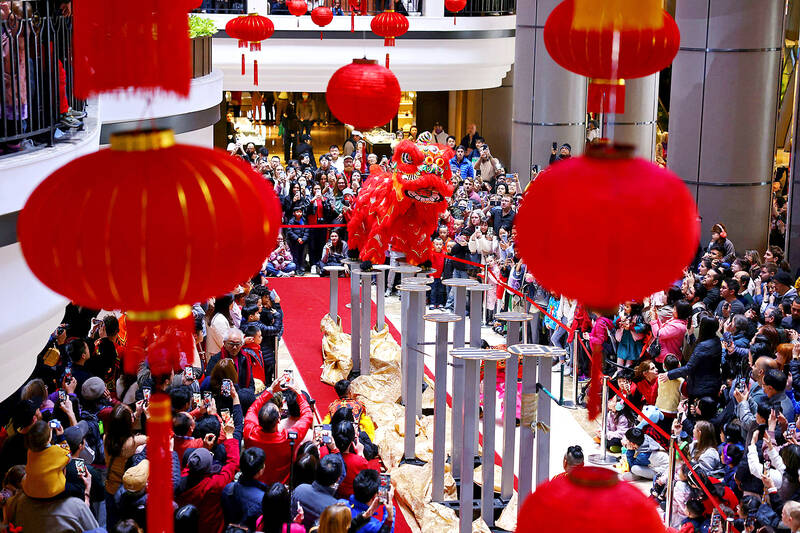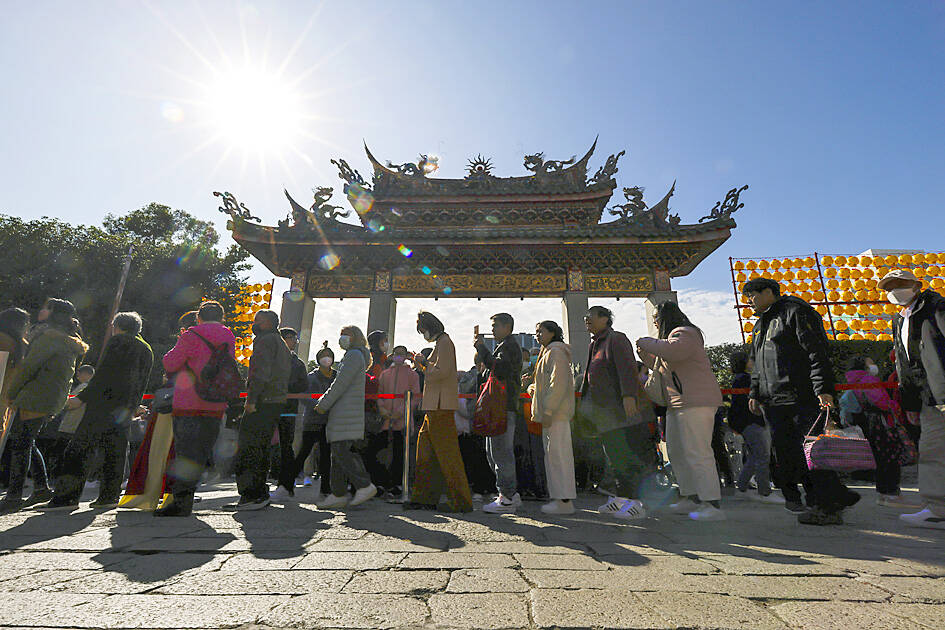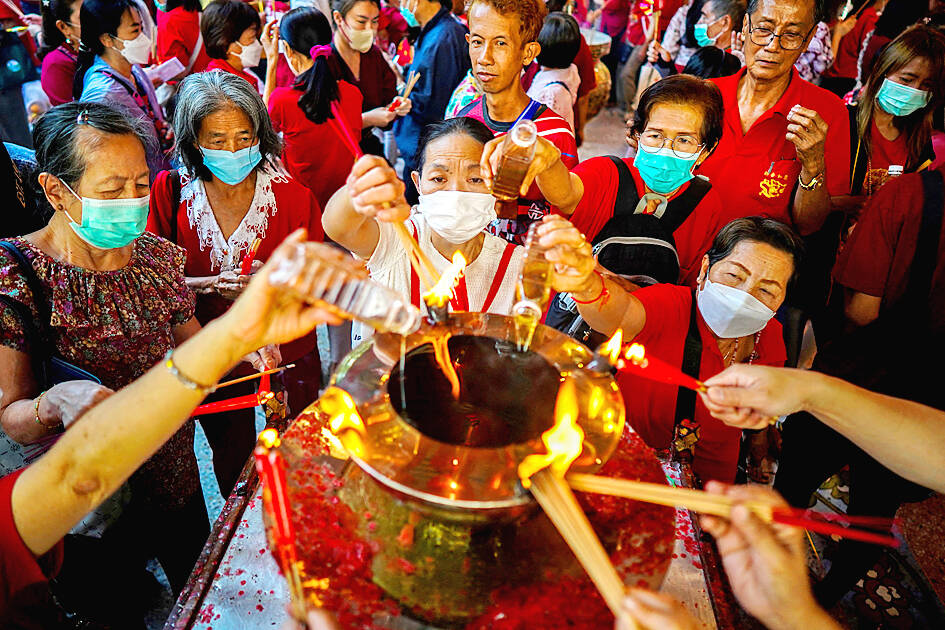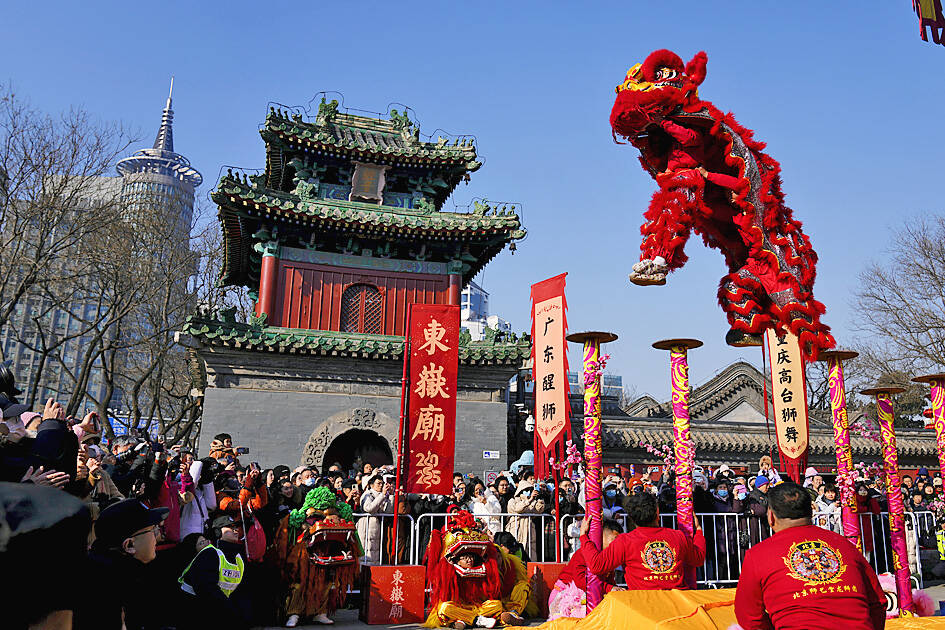From prayer rituals at temples in Taipei and Bangkok to incense offerings and vibrant lion dances in Beijing, hundreds of millions of people across Asia yesterday celebrated the Lunar New Year, ushering in the Year of the Snake.
In Taiwan yesterday morning, people of all ages poured into temples to make offerings of fruit, sweets, crackers and nuts.
“Our tradition is to visit the temple and pray, for better fortune for this year,” said Chen Ching-yuan, 36, as she visited Longshan Temple (龍山寺) in Taipei’s Wanhua District (萬華) with her mother.

Photo: Annabelle Chih, Reuters
“There’s no need to ask for anything specific, just wish for a smooth, peaceful, safe and healthy year, and pray that everything goes well,” Chen said.
Some temple-goers ushered in the new year by racing to be the first to light incense in the pursuit of good fortune.
“I didn’t want to look back with regret when I’m old, so I decided to go for it,” Kao Meng-shun said at Fusing Temple (福興宮) in Yunlin County’s Siluo Township (西螺).

Photo: Ritchie B. Tongo, EPA-EFE
In China, people enjoy eight consecutive public holidays for the Spring Festival, an opportunity to share meals, attend traditional performances and set off fireworks.
Train stations and airports across the country have been jam-packed for weeks as millions returned home to spend the holidays with their loved ones in an annual migration that is expected to be a record.
Temples and parks in Beijing yesterday were full with people braving freezing temperatures to bid farewell to the Year of the Dragon with dancing and prayers.

Photo: Reuters
High streets, shopping malls, offices and homes were bedecked in festive red banners — believed to ward off evil — throughout many parts of East and Southeast Asia, including South Korea, Singapore, Vietnam and Thailand.
In Bangkok, throngs of locals and tourists made their way to Wat Mangkon Kamalawat, the capital’s most revered Chinese temple.
Built in 1871 by immigrants from southern China, the temple marks its 154th anniversary this year and remains a key worshiping site for the Thai-Chinese community.

Photo: AP
Sasakorn Udomrat, 56, has been coming to the temple for eight consecutive years.
“I have many Thai-Chinese friends who say this temple is very sacred,” she said. “I don’t ask for anything in particular, just good health.”
Another worshiper Nawarat Yaowanin, 42, said that “according to the Chinese calendar, it’s a brewing year for me.”
“I came here to pay my respects and hope to ward off bad luck,” she said.
Crowds also filled the streets in the Philippine and Indonesian capitals for vibrant lion dance parades.

Nvidia Corp yesterday unveiled its new high-speed interconnect technology, NVLink Fusion, with Taiwanese application-specific IC (ASIC) designers Alchip Technologies Ltd (世芯) and MediaTek Inc (聯發科) among the first to adopt the technology to help build semi-custom artificial intelligence (AI) infrastructure for hyperscalers. Nvidia has opened its technology to outside users, as hyperscalers and cloud service providers are building their own cost-effective AI chips, or accelerators, used in AI servers by leveraging ASIC firms’ designing capabilities to reduce their dependence on Nvidia. Previously, NVLink technology was only available for Nvidia’s own AI platform. “NVLink Fusion opens Nvidia’s AI platform and rich ecosystem for

‘WORLD’S LOSS’: Taiwan’s exclusion robs the world of the benefits it could get from one of the foremost practitioners of disease prevention and public health, Minister Chiu said Taiwan should be allowed to join the World Health Assembly (WHA) as an irreplaceable contributor to global health and disease prevention efforts, Minister of Foreign Affairs Lin Chia-lung (林佳龍) said yesterday. He made the comment at a news conference in Taipei, hours before a Taiwanese delegation was to depart for Geneva, Switzerland, seeking to meet with foreign representatives for a bilateral meeting on the sidelines of the WHA, the WHO’s annual decisionmaking meeting, which would be held from Monday next week to May 27. As of yesterday, Taiwan had yet to receive an invitation. Taiwan has much to offer to the international community’s

CAUSE AND EFFECT: China’s policies prompted the US to increase its presence in the Indo-Pacific, and Beijing should consider if this outcome is in its best interests, Lai said China has been escalating its military and political pressure on Taiwan for many years, but should reflect on this strategy and think about what is really in its best interest, President William Lai (賴清德) said. Lai made the remark in a YouTube interview with Mindi World News that was broadcast on Saturday, ahead of the first anniversary of his presidential inauguration tomorrow. The US has clearly stated that China is its biggest challenge and threat, with US President Donald Trump and US Secretary of Defense Pete Hegseth repeatedly saying that the US should increase its forces in the Indo-Pacific region

ALL TOGETHER: Only by including Taiwan can the WHA fully exemplify its commitment to ‘One World for Health,’ the representative offices of eight nations in Taiwan said The representative offices in Taiwan of eight nations yesterday issued a joint statement reiterating their support for Taiwan’s meaningful engagement with the WHO and for Taipei’s participation as an observer at the World Health Assembly (WHA). The joint statement came as Taiwan has not received an invitation to this year’s WHA, which started yesterday and runs until Tuesday next week. This year’s meeting of the decisionmaking body of the WHO in Geneva, Switzerland, would be the ninth consecutive year Taiwan has been excluded. The eight offices, which reaffirmed their support for Taiwan, are the British Office Taipei, the Australian Office Taipei, the